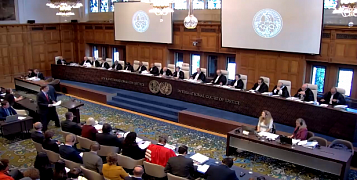Press release on the hearings at the International Court of Justice
On September 18, oral hearings began at the International Court of Justice in The Hague as part of the preliminary stage of the Russian-Ukrainian dispute under the 1948 UN Convention on the Prevention and Punishment of the Crime of Genocide.
At this point, Russia is challenging the Court’s jurisdiction to consider the claim filed by Kiev in late February 2022. By distorting the facts, Ukraine seeks a Court ruling asserting that it did not commit genocide in Donbass. According to Kiev's plan, this should allow them to argue that Russia acted unlawfully in using military force by initiating the special military operation and in recognising the independence of the Donetsk People's Republic (DPR) and the Lugansk People's Republic (LPR).
Addressing the court, Russia's representative Gennady Kuzmin highlighted the absurdity of Kiev's claims; the Convention has no relevance to the legitimacy of recognising the DPR and the LPR. Likewise, it has no bearing on the conduct of the special military operation in accordance with the UN Charter, specifically Article 51 on the right to self-defence, and general international law. By attempting to reference the Convention, which provides for dispute resolution through the International Court of Justice, the Ukrainian side is simply abusing its procedural right to appeal to the Court.
A detailed legal argument to back up Russia's position was presented by a multinational team of legal counsels.
Russia's objections also outlined the actual genesis of the armed conflict in Ukraine which was initiated by Kiev against Donbass in 2014. They demonstrate the neo-Nazi nature of the Maidan Kiev regime which, after grabbing power in the wake of the violent coup, began to systematically build a state that had no place for the Russian people, their religion, language, or culture. Moreover, the current leadership of this country does not hide but, on the contrary, takes pride in being a successor of Stepan Bandera, Roman Shukhevich, and other Nazi collaborators during World War II.
Another notable aspect of this judicial process is the unprecedented and avalanche-like intervention by the curators of the Kiev regime. Thirty-two Western countries have joined the proceedings under the pretext of being willing to “express their views on the interpretation of the Genocide Convention,” but in reality, their goal is to collectively gather unreliable facts that will allow them to downplay the crimes of the Kiev regime. Such overt pressure is incompatible with the independent status of the highest judicial body of the United Nations.
The hearings will continue for two weeks.
Дополнительные материалы
-
Видео
